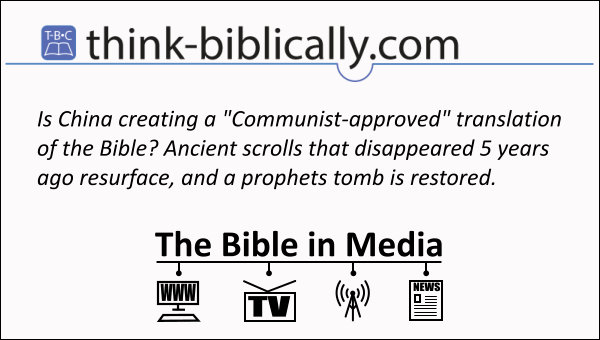By Tyson Thorne

"Media" used to mean "print media" like books and newspapers, but the world has grown. Today media can also mean radio, television and movies delivered to personal computers, tablets and cell phones. As the world's best selling book of all time the Bible continues to make headlines, both good and bad, across all forms of media. This week in the Bible and Media: Is China going to create their own "Communist-approved" translation of the Bible? Also, ancient scrolls that disappeared five years ago resurface, and a Hebrew prophets tomb is restored and open for visitors once more.
It has been reported in The Christian Journal and elsewhere that the Chinese government will be translating their own version of the Bible that will support "Chinese-style Christianity and Theology". The journal claims the paper China's Policies and Practices on Protecting Freedom of Religious Belief is the source of this information. While I would not put such a strategy beyond the consideration of the Communist Party of China (CPC), there is no such indication, at least in this report, that the government has any plans to change or re-translate or reinterpret the Bible. I've read the report in its entirety. While the report is clear that the CPC views religions the same way they do their people -- as servants of the state -- there is no indication the Chinese government is doing anything to the Christian Bible except making it very difficult to purchase (as we reported last week). So file this story under "fake news" for now.
According to the Times Of Israel, a number of ancient Torah scrolls lost in Syria in 2013 have resurfaced in Turkey earlier this year. Once belonging to a Jewish Synagogue in Syria, the locale had been attacked by extremist Muslims. A group of independent Muslims hid the items and entrusted them to a single individual for safe keeping. It is thought that this individual moved, possibly sold, a few of the items that have now turned up in Turkey. The ancient scrolls, while not as old as the Dead Sea Scrolls, are still an important part of the Bible's history. If ever there was a compelling reason to pray for Middle East peace, this is it.
When it comes to ancient sites, especially burial sites, one has to take tradition alongside a dash of salt. Take the prophet Jonah's tomb that was destroyed by Muslim extremists a few years ago. Considered a terrible loss to Jewish, Christian and Muslim followers alike, many mourned the senseless destruction. The truth is, however, that while the site had a long tradition it was unlikely the true site of the prophets last home. So it is with a little skepticism that we come to the latest concern, the burial site of the prophet Nahum. It too has a long tradition with people of all three faiths making pilgrimages over the centuries to this little known resting place. Located on the Nineveh Plains of northern Iraq, is a small town named al-Qosh whose only claim to fame is the tomb of Nahum.
In 1950 the town was largely abandoned and inhabited by a small group of Christians. They did their best to protect the site but the recent wars took their toll and the site has fallen into disrepair. Walls are crumbling, the roof is starting to collapse and the columns have begun tilting at odd angles. Thankfully last year the Alliance for Restoration of Cultural Heritage took notice and are working to restore this ancient site. More work needs to be done, but they have made great progress and the locals are hoping pilgrimages will once again be made. ARCH is fundraising for continuing the restoration project and, for now, the tomb appears to have renewed life. If you are traveling to the region it may be an interesting place to visit.
.
